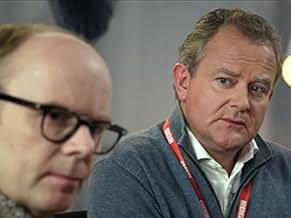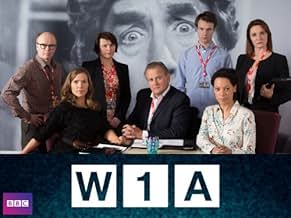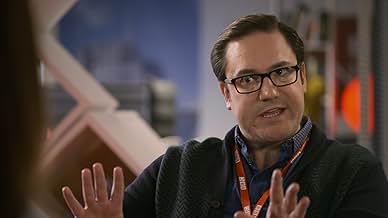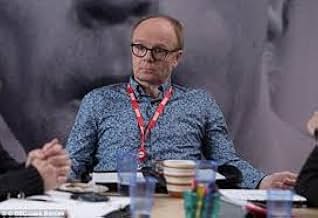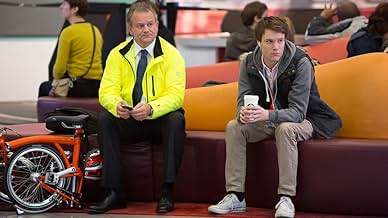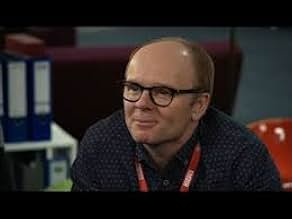Ian Fletcher, ex Jefe de la Comisión de Liberación Olímpica, ha asumido el cargo de Jefe de Valores en la BBC.Ian Fletcher, ex Jefe de la Comisión de Liberación Olímpica, ha asumido el cargo de Jefe de Valores en la BBC.Ian Fletcher, ex Jefe de la Comisión de Liberación Olímpica, ha asumido el cargo de Jefe de Valores en la BBC.
- Ganó 1 premio BAFTA
- 3 premios ganados y 3 nominaciones en total
Explorar episodios
Opiniones destacadas
I watched the first few episodes of the first season and giggled appropriately. Goodness knows the BBC makes a good target for this kind of satire and is a good proxy for many similar corporate settings. But after a while fatigue set in. Compared with Twenty Twelve which was consistently laugh-out-loud funny, too many characters in W1A share similar lines and "yes/no/cool" affectations. But what really fails is the mockumentary angle. It was tenuous in Twenty Twelve but just about kept within the lines as an unlikely but feasible documentary. W1A would have been better pitched as a straightforward satirical comedy rather than having a narration constantly remind the viewer that we are supposed to regard this as a reality programme.
I found this very funny and very true. I worked at BBC Future Media (and other parts of the BBC) and recognise a number of these senior managers. The caricatures are not far removed from reality. On the creative side, you might think the show was cruel. Not really, they used to have weekly "creative sessions" in my kitchen area. There's nothing like the sight of desperate 40-somethings trying to come up with something young and hip to make you wish you were far, far away from the commissioning process and the necessary obliges noblesses! The meeting rooms, "Strictly Come Dancing" and "Top Gear" and so on, and Syncopatispace is beyond parody. This show is almost exactly like working there.
I suspect that some of the reviews here have been made by people who are perhaps too close to the BBC, or are amongst a significant section of the British population who regard the licence fee as the wrong way to fund the Corporation.
I didn't see "Twenty Twelve" (but have just ordered the DVDs of Series 1 & 2), and in fact have only managed to see the first two episodes of "W1A". That clearly leaves me open to criticism for reviewing a series I haven't fully seen. On the other hand, it meant that I had no particular expectations before I viewed.
What I did see I found to be hugely funny - certainly one of the most wryly observed and succinctly written comedies of recent years.
Yes, I am sure that what it portrays is desperately close to reality! And indeed, that is what makes it all the funnier. The characters are, of course, caricatures with little depth, but in a light-hearted series of just four episodes, I doubt we would be expecting serious character development, especially when some of them speak the same (or similar) lines in every episode.
As a Brit who loves the BBC, despite its weaknesses and failings, and who thinks the licence fee is truly excellent value for money, I admire the organisation all the more for its willingness to have the mickey taken in this way.
Reading the other reviews, you might think that there was little to laugh at in this short series. Far from it. I very rarely laugh out loud, but this had me chortling more than most.
I didn't see "Twenty Twelve" (but have just ordered the DVDs of Series 1 & 2), and in fact have only managed to see the first two episodes of "W1A". That clearly leaves me open to criticism for reviewing a series I haven't fully seen. On the other hand, it meant that I had no particular expectations before I viewed.
What I did see I found to be hugely funny - certainly one of the most wryly observed and succinctly written comedies of recent years.
Yes, I am sure that what it portrays is desperately close to reality! And indeed, that is what makes it all the funnier. The characters are, of course, caricatures with little depth, but in a light-hearted series of just four episodes, I doubt we would be expecting serious character development, especially when some of them speak the same (or similar) lines in every episode.
As a Brit who loves the BBC, despite its weaknesses and failings, and who thinks the licence fee is truly excellent value for money, I admire the organisation all the more for its willingness to have the mickey taken in this way.
Reading the other reviews, you might think that there was little to laugh at in this short series. Far from it. I very rarely laugh out loud, but this had me chortling more than most.
"You're aware that you're at the centre of something genuinely important, and the exciting thing is to think that part of the job is establishing where that centre is, and what it's in the middle of." It's hard to parody something that's already a parody of itself, so W1A (BBC2) – the BBC's bizarre and surreal mickey take of its own corridors of power – must be viewed in context.
Because the sad truth is that the real-world BBC is far more bizarre and surreal than this fairly tame spoof, and the only real mickey take in the equation is the way the real Beeb behaves while claiming to serve its hard-working license payers.
BBC2′s continuity announcer accidentally introduced W1A by calling it a "new drama." A Freudian slip, no doubt, by a BBC staffer on the brink of insanity.
Noel Edmonds went on Newsnight this week and announced that he wants to buy the BBC. Remind me, was that in the spoof version of the corporation or in the real-world BBC? It's almost impossible to tell.
I've worked for the BBC many times, in many different roles, so I suppose I should have found W1A hilarious. However, it was so close to the truth that all the programme actually succeeded in doing was to remind me of the anger, frustration and helplessness I felt while working there.
Most of the meetings really are a ridiculous waste of time. Many of the managers genuinely are pointless, poorly informed, time-servers who are only interested in protecting their own interests. Verbal communications skills are virtually non-existent in many Social Media-obsessed staff, and the curse of hopping from hot desk to hot desk means it's impossible to hold a meaningful conversation or concentrate on anything at all in your own space.
W1A is written by the same team who brought us the brilliant Twenty Twelve. David Tennant's back as the deadpan and slightly puzzled narrator, and Ian Fletcher (Hugh Bonneville) moves from Head of Deliverance at the Olympics to becoming Head of Values at the BBC. Jessica Hynes also returns as Siobhan Sharp, the air-headed PR guru.
There are many new faces as well, notably Jason Watkins as the slimy and grinning Head of Strategic Governance, and Hugh Skinner as Will – the intellectually challenged intern who seems to struggle with even the most basic of tasks. Will's epic mental battle in delivering two cups of coffee to their recipients was one of the highlights of the first episode. I suspect his character will rise swiftly through the ranks and will probably end up as Director General if the show runs long enough.
Just as David Brent was far too painful to watch if you worked in an office, W1A may be a little too much for many BBC staff to endure. Alan Yentob and Salman Rushdie arm-wrestling in a meeting room? Remind me, was that in W1A, or did I see it on this week's Newsnight?
Because the sad truth is that the real-world BBC is far more bizarre and surreal than this fairly tame spoof, and the only real mickey take in the equation is the way the real Beeb behaves while claiming to serve its hard-working license payers.
BBC2′s continuity announcer accidentally introduced W1A by calling it a "new drama." A Freudian slip, no doubt, by a BBC staffer on the brink of insanity.
Noel Edmonds went on Newsnight this week and announced that he wants to buy the BBC. Remind me, was that in the spoof version of the corporation or in the real-world BBC? It's almost impossible to tell.
I've worked for the BBC many times, in many different roles, so I suppose I should have found W1A hilarious. However, it was so close to the truth that all the programme actually succeeded in doing was to remind me of the anger, frustration and helplessness I felt while working there.
Most of the meetings really are a ridiculous waste of time. Many of the managers genuinely are pointless, poorly informed, time-servers who are only interested in protecting their own interests. Verbal communications skills are virtually non-existent in many Social Media-obsessed staff, and the curse of hopping from hot desk to hot desk means it's impossible to hold a meaningful conversation or concentrate on anything at all in your own space.
W1A is written by the same team who brought us the brilliant Twenty Twelve. David Tennant's back as the deadpan and slightly puzzled narrator, and Ian Fletcher (Hugh Bonneville) moves from Head of Deliverance at the Olympics to becoming Head of Values at the BBC. Jessica Hynes also returns as Siobhan Sharp, the air-headed PR guru.
There are many new faces as well, notably Jason Watkins as the slimy and grinning Head of Strategic Governance, and Hugh Skinner as Will – the intellectually challenged intern who seems to struggle with even the most basic of tasks. Will's epic mental battle in delivering two cups of coffee to their recipients was one of the highlights of the first episode. I suspect his character will rise swiftly through the ranks and will probably end up as Director General if the show runs long enough.
Just as David Brent was far too painful to watch if you worked in an office, W1A may be a little too much for many BBC staff to endure. Alan Yentob and Salman Rushdie arm-wrestling in a meeting room? Remind me, was that in W1A, or did I see it on this week's Newsnight?
I suppose the natural career change for "2012"'s Olympics supremo Ian Fletcher was to an executive position at another of the great talking-shops, the BBC itself. Thus "W1A" continues very much in the footprints of its predecessor, with Fletcher at the centre of the middle of things at the Beeb, quickly becoming the spokesperson and whipping boy for a number of topical-at-the-time scandals at the corporation, involving regional discrimination and pay levels. Now with the Quango-esque title "Head Of Values" he's soon involved with a similar group of headless deadbeats talking lots but saying little in another amusing spoof comedy.
The problem for me was the too-similar format to "2012" right down to each episode starting with him turning up to work and attending morning meetings although this time there was much less emphasis on his private life. The supporting cast includes the excruciatingly on-point media guru Siobhan "Sure, great" from the show before and a bunch of colleagues not markedly different again to those before. Therein lies the problem, with the show somewhat lacking in freshness with not only the characters but some of the plot devices seeming a bit second hand. I also think more could have been done to make use of the real-life BBC talent available apart from the amusing spat between Clare Balding and Carol Vorderman to see who gets to partner Alan Titchmarsh in a new reality show "The Tastiest Village in Britain".
There are amusing moments for sure particularly when Siobhan attempts to rebrand the BBC for the Apps market and Bonneville leads a good cast who play their quirky characters to the hilt. Nice to see Olivia Colman in a cameo role too. All told though, the law of diminishing returns appears to be in action here although somehow it wouldn't surprise me to see Ian Fletcher in future park his fold-down bike at the biggest talking-shop of all the House of Commons in an as yet unwritten sequel to his latest misadventures.
The problem for me was the too-similar format to "2012" right down to each episode starting with him turning up to work and attending morning meetings although this time there was much less emphasis on his private life. The supporting cast includes the excruciatingly on-point media guru Siobhan "Sure, great" from the show before and a bunch of colleagues not markedly different again to those before. Therein lies the problem, with the show somewhat lacking in freshness with not only the characters but some of the plot devices seeming a bit second hand. I also think more could have been done to make use of the real-life BBC talent available apart from the amusing spat between Clare Balding and Carol Vorderman to see who gets to partner Alan Titchmarsh in a new reality show "The Tastiest Village in Britain".
There are amusing moments for sure particularly when Siobhan attempts to rebrand the BBC for the Apps market and Bonneville leads a good cast who play their quirky characters to the hilt. Nice to see Olivia Colman in a cameo role too. All told though, the law of diminishing returns appears to be in action here although somehow it wouldn't surprise me to see Ian Fletcher in future park his fold-down bike at the biggest talking-shop of all the House of Commons in an as yet unwritten sequel to his latest misadventures.
¿Sabías que…?
- TriviaThe cast list gives Ben and Jerry's surnames as Rosenstern and Guildencranz. This is a reference to Rosencrantz and Guildernstern, two minor characters in Shakespeare's play National Theatre Live: Hamlet (2015). In Tom Stoppard's play of 1966 National Theatre Live: Rosencrantz & Guildenstern Are Dead (2017) he flips the plot and they become the major characters. In Stoppard's play they are like two halves of a single character and other characters in the play have trouble distinguishing which one is which; much like the hapless Ben and Jerry.
- ConexionesFeatured in The Wright Stuff: Episode #19.55 (2014)
Selecciones populares
Inicia sesión para calificar y agrega a la lista de videos para obtener recomendaciones personalizadas
- How many seasons does W1A have?Con tecnología de Alexa
Detalles
Contribuir a esta página
Sugiere una edición o agrega el contenido que falta


